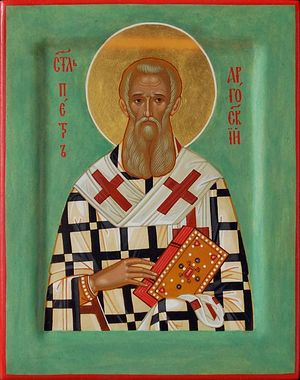Saint Peter the Wonderworker, Bishop of Argos in the Peloponnesos, lived during the ninth and early tenth centuries, and was raised by pious parents. Saint Peter’s parents, and later his brothers Paul, Dionysius, Platon and Saint Peter himself, all became monks. Saint Peter zealously devoted himself to monastic labors, and he excelled all his fellows. This came to the attention of the Italian bishop Nicholas (who from 895 was Patriarch of Constantinople), who wanted to elevate him to the rank of bishop. Saint Peter declined, accounting himself unworthy of such honor.
Bishop Nicholas consecrated Paul, Saint Peter’s brother, as Bishop of Corinth, and Saint Peter went to his brother and lived with him, taking upon himself the spiritual struggle of silence. After a year emissaries came to Bishop Paul from the city of Argos, where the bishop had died, and they asked for Saint Peter as their bishop. After long and intense entreaties, Saint Peter finally gave his consent. As bishop, Saint Peter toiled zealously in guiding his flock. He was extraordinarily compassionate, concerning himself with those in need, especially orphans and widows.
The saint fed the hungry in years of crop failure. Through his prayers the food set aside for the hungry never ran out. The saint also ransomed captives, healed the sick and the afflicted, and possessed the gift of insight. The saint predicted the day of his death, and departed to the Lord at the age of seventy. His relics were transferred from Argos to Nauplos in 1421, exuding myrrh, and working miracles and healings.



